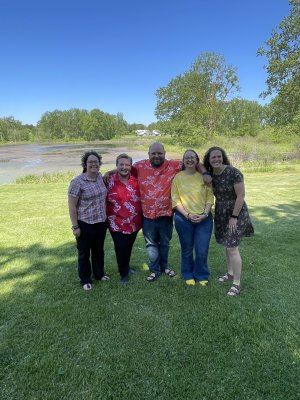Graduate Projects 2023-24
 Early Childhood Education Meets Environmental Education in Professional Development
Early Childhood Education Meets Environmental Education in Professional Development
– Stephany Hancock
Inspired in part by experiences with the Nature Preschool at Merry Lea, and leveraging her own past experience as a preschool educator, Stephany developed in-service professional development materials for preschool teachers that focused on using natural spaces at or very near their school. Through collaboration with two preschools in northeast Indiana, she explored a series of content pieces and pedagogical approaches that could be of use to teachers in those schools, and then developed multi-day training materials to incorporate those ideas. Finally, she actually implemented those trainings at both schools and received feedback from those teachers on her design work. This experience helped her to realize both an interest in and capacity for being a professional development educator that she had not recognized before.
Creation Care: A Brethren Perspective
– Jamie McBride
Seeking to connect her own convictions around Christian faith and creation care, Jamie partnered with other members of the Brethren in Christ church to create a multi-session Sunday School curriculum geared towards helping adult learners understand and grow in their commitment to caring for creation. Her curriculum included a mix of Scripture study, exploration of Brethren church principles as applied to creation, and discussion of practical approaches to creation care that everyday churchgoers could take. She then trialed this curriculum with a local Brethren congregation, and incorporated feedback from that experience to revise and strengthen the curriculum.
Introducing Grazing to Schoolyard Prairies
– Mike Miller
Eyeing a post-MAEE career as a high school science teacher, Mike developed a detailed curriculum and management plan for high schools to use that focuses on native grasslands, rotational grazing, and carbon sequestration. Designed especially for biology, environmental science, or agriculture classes, his materials included a series of lessons to guide students into thinking about the ecological interactions involved in managed rotational grazing, as well as the practical considerations that would go into any school choosing to manage their native grasslands with grazing animals. Mike’s work was done in close conversation with staff at a local Montessori high school looking to expand the use of grazing animals on their school grounds, and resulted in high levels of integration between the scholastic and pragmatic sides of that project for their school.
Integrating Project Management, Mentorship, & Environmental Education: A Higher Education Case Study
– Jeremiah Sharp
With a strong background in field ecology, Jeremiah sought to build his project around applying those skills and knowledge through education-as-project-management. He worked with several learner groups, a motivated independent-study high schooler and college students in ecology, to design and implement research and land management projects. Throughout the process of shepherding these students through their projects, he was paying close attention to the meta-structures of that work. What level of specificity was necessary to guide different learners into different applied tasks? How could field research be done in a way to maximize learner curiosity, accountability, and buy-in? And other questions that help to make field-based teaching more dynamic and transformative for ecology learners. The results of his work not only helped the immediate students he was working with, but are also informing ongoing educational efforts at their institutions.
Rooted: Life-Stage Retreats as Environmental Education
– Eva Webb
Eva used her year-long project to explore ways to build spiritual and emotional connections between people and the natural world, particularly at people’s key life transitions. From personal experience Eva had seen how important drawing spiritual strength from encounters with the rest of creation could be when life was especially stressful or full of change. To focus this work, Eva designed a weekend retreat for upper-level college students who were close to finishing school, beginning careers, thinking about long-term family relationships, and the like. Through a variety of structured experiences in natural settings close to students’ home campuses, Eva hoped to show how relatively simple practices in the outdoors could be a linchpin to help young people connect with themselves, other creatures, and God during life’s major moments. She designed one version especially for students from a Christian college, and another that was more generally accessible and not as specific in faith references.




